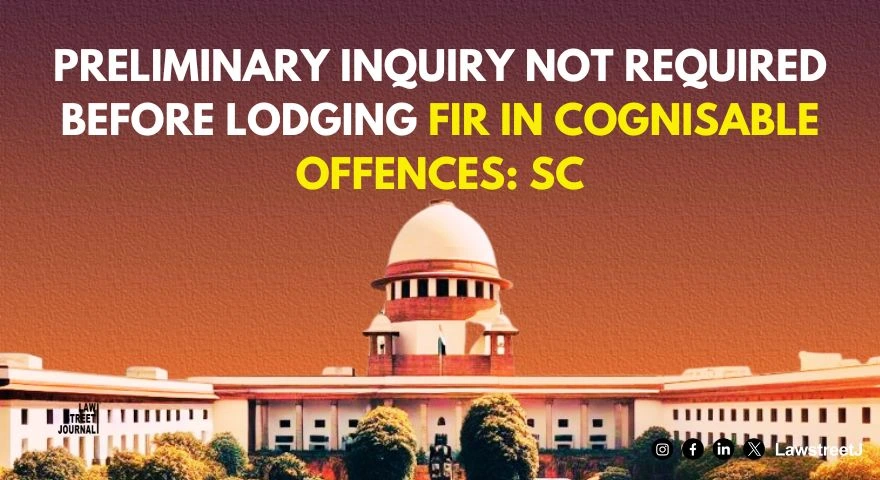NEW DELHI: The Supreme Court has said the registration of an FIR is mandatory under Section 154 CrPC if the information discloses the commission of a cognizable offence as held categorically by this court in 'Lalita Kumari Vs Government of Uttar Pradesh & Ors' (2014).
SC Rules: No Preliminary Inquiry Needed Before FIR in Cognisable Offences
A bench of Justices Vikram Nath and Prasanna B Varale clarified that the police have no discretion to conduct a preliminary inquiry before registering the FIR, if the information clearly disclosed a cognisable offence.
The court said the 2014 judgment has clarified the scope of a preliminary inquiry is limited to situations where the information received does not prima facie disclose a cognisable offence but requires verification.
"However, in cases where the information clearly discloses a cognisable offence, the police have no discretion to conduct a preliminary inquiry before registering an FIR," the bench emphasised.
Lalita Kumari Judgment Reaffirmed: Mandatory FIR Registration Explained
The court also clarified that the decision in Lalita Kumari does not create an absolute rule that a preliminary inquiry must be conducted in every case before the registration of an FIR.
"Rather, it reaffirms the settled principle that the police authorities are obligated to register an FIR when the information received prima facie discloses a cognizable offence," it said.
The bench rejected a plea by retired IAS officer Pradeep N Sharma against the Gujarat High Court's judgment of January 31, 2024, which dismissed his plea for a direction to the authorities to conduct a preliminary inquiry before registering any FIR against him for acts performed in his official capacity.
"This court cannot issue a blanket direction restraining the registration of FIRs against the appellant or mandating a preliminary inquiry in all future cases involving him. Such a direction would not only be contrary to the statutory framework of the CrPC but would also amount to judicial overreach," the bench said.
The court also pointed out the High Court has rightly observed that courts cannot rewrite statutory provisions or introduce additional procedural safeguards that are not contemplated by law.
Sharma claimed several FIRs were registered against him in connection with alleged irregularities in land allotment orders issued by him as the Collector of Kachchh District, Gujarat, between 2003 and 2006.
Questioning rejection of his plea by the High Court's judgment, he claimed his fundamental rights, particularly his right to liberty under Article 21, were being violated due to successive and arbitrary registration of criminal cases without conducting a preliminary inquiry.
Relying upon the Lalita Kumari judgment, he contend all those cases were lodged with an ulterior motive even after his superannuation in 2015 in order to harass him.
The court, however, found the allegations made against him fell squarely within the category of cognisable offences.
"There existed no legal requirement for a preliminary inquiry before the registration of an FIR in such cases," it said.
So far as his allegation of ulterior motive was concerned, the bench said it is a matter that can be examined during the course of investigation and trial only.
The court also said he has adequate remedies under the law, including the right to seek quashing of frivolous FIRs under Section 482 CrPC, the right to apply for bail, and the right to challenge any illegal actions of the investigating authorities before the appropriate forum.















